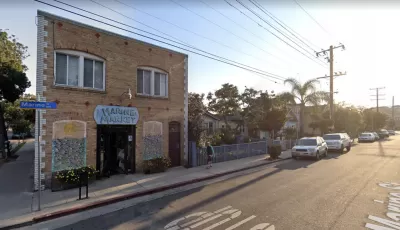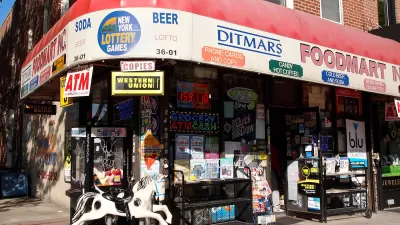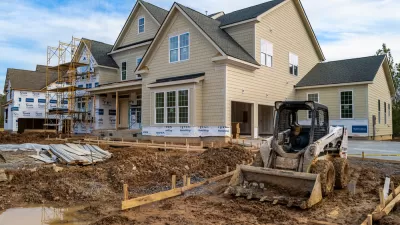A Portland, Oregon urban planner is pitching the idea of ACUs, or accessory commercial units, as a means of repairing the effects of excluding retails uses from residential neighborhoods.

Adele Peters reports on an idea called ACUs, or accessory commercial units, explained thusly: "If backyard cottages (also known as ADUS, or accessory dwelling units) have become an increasingly common way to add new housing to existing neighborhoods, ACUs in the front could help add new businesses."
Peters gives credit for the term to Neil Heller, who runs an urban planning firm called Neighborhood Workshop, who was inspired by the idea while dealing with the pandemic closure of the firm's office. "As many people continue working from home—in the case of some tech workers, indefinitely—Heller considered another possibility," writes Peters. "Could some small businesses relocate to residential neighborhoods?"
This type of space was more common in the past; if you walk around some 1920s-era neighborhoods, it’s not unusual to see a tiny grocery store or even smaller commercial space sitting on an otherwise residential block. Heller hypothesizes that as cars became widespread in cities, some businesses chose to relocate to streets with the most traffic. Zoning laws also changed. “Zoning updates became more exclusively residential, and beyond that, became more exclusively single-family,” he says. “So we sort of just zoned everything out. Most of our cities are just single-family houses only. We’ve become very, very myopic in our scope of what we want to allow in our neighborhoods.”
Like its zoned out cousin, the corner store, allowing ACUs would require zoning changes, and perhaps even entirely new zoning code designations, assuming that most cities don't already have a residential zoning designation that allows for an extra structure on a residential property for the conducting of local serving business (photographic evidence of the existence of such buildings is provided in the source article). Even allowing corner stores on properties in residential neighborhood can prove a challenge, despite efforts at reform from organizations like the Congress for New Urbanism. The effect of allowing ACUs and corner stores in residential neighborhoods, according to the article by peters, would be a huge step toward the 15-minute city, where most trips for services can be completed on foot, of some many U.S. planners' dreams.
FULL STORY: With downtowns staying abandoned, put tiny businesses back into residential neighborhoods

Study: Maui’s Plan to Convert Vacation Rentals to Long-Term Housing Could Cause Nearly $1 Billion Economic Loss
The plan would reduce visitor accommodation by 25,% resulting in 1,900 jobs lost.

North Texas Transit Leaders Tout Benefits of TOD for Growing Region
At a summit focused on transit-oriented development, policymakers discussed how North Texas’ expanded light rail system can serve as a tool for economic growth.

Why Should We Subsidize Public Transportation?
Many public transit agencies face financial stress due to rising costs, declining fare revenue, and declining subsidies. Transit advocates must provide a strong business case for increasing public transit funding.

How to Make US Trains Faster
Changes to boarding platforms and a switch to electric trains could improve U.S. passenger rail service without the added cost of high-speed rail.

Columbia’s Revitalized ‘Loop’ Is a Hub for Local Entrepreneurs
A focus on small businesses is helping a commercial corridor in Columbia, Missouri thrive.

Invasive Insect Threatens Minnesota’s Ash Forests
The Emerald Ash Borer is a rapidly spreading invasive pest threatening Minnesota’s ash trees, and homeowners are encouraged to plant diverse replacement species, avoid moving ash firewood, and monitor for signs of infestation.
Urban Design for Planners 1: Software Tools
This six-course series explores essential urban design concepts using open source software and equips planners with the tools they need to participate fully in the urban design process.
Planning for Universal Design
Learn the tools for implementing Universal Design in planning regulations.
Ascent Environmental
Borough of Carlisle
Institute for Housing and Urban Development Studies (IHS)
City of Grandview
Harvard GSD Executive Education
Toledo-Lucas County Plan Commissions
Salt Lake City
NYU Wagner Graduate School of Public Service





























